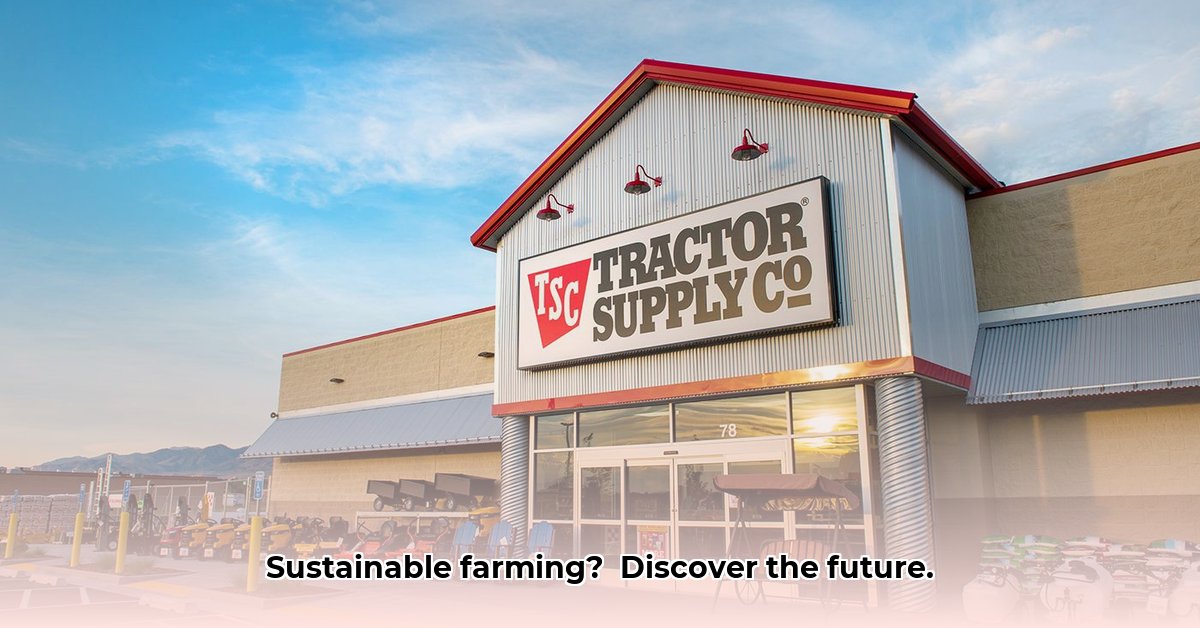
Farming is undergoing a significant transformation, driven by the increasing demand for sustainable agricultural practices. Companies like Porter Tractor Supply are playing a crucial role in this shift, offering innovative equipment and resources that help farmers balance profitability with environmental responsibility. This article explores Porter's contribution to sustainable agriculture, focusing on the challenges and opportunities presented by this transition. For more information on tillers, check out our selection of rototillers.
The Porter Orchard Boss and Sustainable Practices
Porter Tractor Supply's Orchard Boss QuadTrax exemplifies the technological advancements driving sustainable farming. This specialized tractor is designed to minimize soil compaction, a major concern in conventional agriculture that leads to reduced yields and environmental degradation. Reduced soil compaction (damage to soil structure) means healthier plants and improved long-term soil health. The QuadTrax's enhanced maneuverability also increases efficiency, allowing farmers to accomplish more work in less time, potentially reducing fuel consumption and operational costs. This presents a compelling case for sustainable farm equipment financing, as outlined in a recent Modern Business Life article 1.
Balancing Tradition with Modern Methods: Porter's Approach
Porter Tractor Supply's strategy isn't solely focused on high-tech solutions. They understand that sustainable farming requires a balanced approach, integrating modern advancements into existing practices. While showcasing innovative equipment like the Orchard Boss, they continue to offer essential supplies like livestock feed and fencing—demonstrating their commitment to supporting the entire needs of farmers, regardless of their level of adoption of new sustainable techniques. This comprehensive approach reflects the practical reality of transitioning to more sustainable agricultural systems.
The Accessibility Hurdle: Making Sustainable Farming Equitable
Despite the benefits of sustainable technologies, significant challenges remain. The high initial cost of advanced equipment presents a major barrier to entry, particularly for small-scale farmers who often lack the capital to invest in upgrades. "Many smaller farms, especially those focused on producing local food, might find the upfront costs prohibitive," leading to an inequitable distribution of benefits from sustainable farming practices. This critical issue requires addressing the question: how can we ensure that the benefits of sustainable agriculture are available to all farmers, regardless of their size or resources?
Bridging the Gap: Creative Solutions for a Sustainable Future
Addressing the accessibility challenge requires a multi-faceted approach. Government subsidies and grants can significantly lower the financial burden of adopting sustainable technologies. Cooperative purchasing programs, where farmers pool resources, can also improve affordability. Furthermore, innovative financing options like leasing programs can make advanced equipment more accessible. This highlights the importance of collaborative efforts between policymakers, equipment manufacturers, and the farming community; only through collaboration can we foster equitable access to sustainable technologies.
The Role of Porter Tractor Supply and Policymakers: A Collaborative Effort
Porter Tractor Supply's role extends beyond simply providing equipment. They can actively promote sustainable practices through educational initiatives, workshops, and online resources. This proactive approach complements governmental efforts to support sustainable agriculture via tax incentives and policies promoting soil health. The synergy between industry leaders like Porter and government initiatives is critical for driving widespread adoption of sustainable farming practices. Investing in reliable rural infrastructure (including internet access) is also critical for connecting farmers with the information and resources they need.
Looking Ahead: Cultivating a Sustainable Future
The transition to sustainable agriculture will require continuous innovation, collaboration, and a proactive approach. Porter Tractor Supply's commitment to integrating both new and traditional farming methods is a positive step, illustrating a practical approach to change. Continued investment in research and development of affordable and accessible technologies is critical, as is open dialogue among farmers, policymakers, and equipment manufacturers. Working together, we can build a food system that is both environmentally sustainable and economically equitable.
Actionable Steps for a Greener Agriculture
- For Small-Scale Farmers: Explore available government grants and subsidies; consider more efficient farming methods (such as no-till farming) to minimize resource needs; participate in group buying programs.
- For Equipment Manufacturers: Focus on developing more affordable and user-friendly sustainable equipment; consider offering flexible financing, such as leasing options.
- For Government Agencies: Provide robust financial support and incentives; invest in soil health initiatives; establish clear industry standards.
- For Porter Tractor Supply: Expand educational resources; offer a wider range of sustainable products at accessible price points.
Key Takeaway: Sustainable agriculture is not merely an environmental imperative; it is also a crucial economic opportunity. By fostering collaboration and addressing accessibility challenges, we can build a more environmentally responsible and economically vibrant agricultural future.